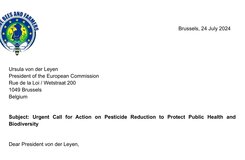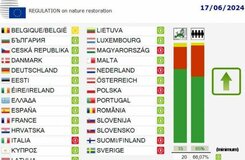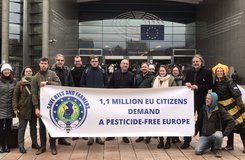Frequently asked questions
What is the “Sustainable Use of Pesticides Regulation”(SUR)?
As part of the Green Deal, the EU is currently discussing a new regulation to reduce pesticide use: the Sustainable Use of Pesticides Regulation (SUR). The proposal includes measures to protect citizens and ecosystems from the harmful effects of pesticides, with binding targets to reduce the use and risk of pesticides by 50% in 2030, in line with the EU’s Farm to Fork and Biodiversity strategies.
The SUR will replace the Sustainable Use of Pesticides Directive (SUD) put in place in 2009. Although the SUD entails key measures to reduce pesticides and protect citizens and ecosystems, it hasn’t led to effective implementation of these measures in EU member states. Since it is a directive, member states need to translate the directive to national law and make sure it is implemented, which in practice hasn’t effectively happened.
To tackle these shortcomings, the SUR proposal was published, as a regulation is directly legally binding in all member states. A clear and directly binding framework is urgently needed to effectively protect the health of citizens, nature and the environment. It represents a first strong step towards a pesticide-free Europe.
Why do we need an ambitious European regulation for pesticide reduction?
The harmful impacts of pesticides can no longer be ignored. Pesticides are among the most toxic substances on the planet, inflicting widespread damage to ecosystems and human health. Farmers and farmworkers are poisoned. Soils and water are heavily polluted. Bees and populations of other pollinators and insects are collapsing, field birds have severely declined, silent spring is closing in. This endangers the future of our food production. Strong pesticide reduction is urgent.
The binding targets in the proposed new pesticide regulation are a crucial step to reduce pesticides in Europe. Over one million EU citizens signed the formal European Citizen Initiative Save Bees and Farmers.They demand a drastic cut in pesticide use and support for farmers to work with nature. Now is the chance for the European Union to deliver - the Members of the European Parliament and ministers must take a strong stance and defend sustainable food systems!
What’s in the proposal for the new pesticide regulation?
The proposal is to set legally binding targets to reduce pesticides both at European and national level. The SUR proposal includes binding targets to halve the use and risk of pesticides by 2030. Binding reduction targets are essential to foster the transition to environmentally-friendly and resilient farming practices, and to effectively decrease the use of pesticides.
Beyond these reduction targets, one of the most important measures of the SUR proposal includes the implementation of Integrated Pest Management (IPM), which means that pesticides can only be applied as a last resort, if all other preventative measures have failed. IPM focuses on the application of good farming practices to prevent pests and make agricultural systems more resilient against pests and diseases, for example through the enhancement of biodiversity and beneficial insects. IPM also entails good monitoring systems and, when a problem arises, giving priority to mechanical weed control and if needed low-risk biological control, before using other pesticides.
While the SUD made IPM mandatory since 2014, effective implementation of IPM in member states has been lacking. The SUR proposal includes the adoption of ‘crop specific rules’, that are directly legally binding in member states. The lack of directly binding IPM rules in member states is one of the key reasons why the current legislation (the “Sustainable Use of Pesticides Directive”) did not result in pesticide reduction since 2009.
The proposal by the European Commission also includes restrictions or bans of pesticide use in specific areas, called “sensitive areas” to protect people and the environment against the harmful effects of pesticides. This includes areas used by the general public (parks, sport grounds…), towns and cities, areas used by vulnerable groups such as children, and protected areas as defined in Natura-2000. Next to the restrictions of pesticides use in these areas, the proposal also includes setting buffer zones around these areas where pesticide use is restricted or banned.
What are alternatives to synthetic pesticides?
There are many alternatives to pesticide use. Organic agriculture does well without using synthetic pesticides and many farms in conventional agriculture have managed to substantially reduce pesticide use using Integrated Pest Management (IPM). IPM tries to prevent pests with good farming practices. If a problem arises mechanical solutions come first and next biocontrol with natural enemies of the pest. Next come low-risk products and synthetic pesticides are used only as a last resort.
Agroecology offers an alternative to pesticide-heavy intensive agriculture. Agroecology is based on ecological, social, and political principles that value healthy and diverse agroecosystems, minimizing external inputs, secure livelihoods for producers, and nutritious food accessible to all. Agroecological practices include crop diversification, planting crops that are adapted to the local environment, crop rotation, using natural preparations, and many other methods to promote beneficial organisms. By supporting farmers (both technically and financially) to adopt agroecological practices, we can significantly reduce the use of pesticides.
Can we produce enough food without pesticides?
We often hear that we will need to produce more and more food, and therefore we need more pesticides. This is the story of the agroindustry. The fact is that we already produce way more food than we need. Food security (i.e that all people have sufficient access to food) depends more importantly on the issue of access and affordability of food. In addition, a lot of our food ends up being wasted and having a big impact on the environment.
Producing enough food using less pesticides is not only possible but is also necessary to ensure food security in the long run. Scientists (PDF document) are clear that Europe can only secure a sustainable food future in the long-term by greening our agricultural model. The continued use of pesticides will damage key ecosystems and biological processes that are essential for agricultural production. To produce good food we need clean water and healthy soil that retains water and helps plants to survive in a warming climate, and biodiversity for crop pollination and to prevent pests.
Does the EU face food shortages because of the war in Ukraine?
The EU does not face food shortages nor a food availability problem. The European Commission’s own food security communication confirms this. While Russia’s invasion of Ukraine has affected global food supplies, Europe has not experienced food shortages. The main products imported from Russia and Ukraine are mostly used for feeding animals, not people. The war in Ukraine is therefore being instrumentalised by industry groups and conservative politicians to defend an industrial model of agriculture dependent on pesticides.
Is pesticide reduction a problem for farmers?
The industrialisation and intensification of our food systems has made many farmers dependent on synthetic pesticides.This is the result of decades of public policies. Farmers should not be blamed for this situation, but should be supported in a fair way in the transition towards a more sustainable agricultural model. A fair price for good food would help them a lot. Less pesticides also means less costs with better revenues. An insurance against crop losses would end the common practice of preventive spraying.
Pesticide reduction would also benefit their health and that of their families. Farmers and farm workers are the first impacted by serious illnesses linked to exposure to synthetic pesticides, including cancer and Parkinson’s disease.
A lot of public money is used to subsidise agriculture. The Common Agricultural Policy (CAP) takes up to a third of the EU budget, but it mostly favors large-scale farms and continues to fuel the intensification of agriculture. These funds should instead be used to support farmers technically and financially in their transition towards environmentally friendly farming practices.
Will reducing pesticides make food more expensive?
In fact, our food is very expensive, only we don’t see the real price. The devastation of our livelihoods and the livelihoods of our children and grandchildren. It is the price that we currently pay worldwide when we buy unsustainably produced, so-called cheap food. The real price does not appear at the checkout. We pay it with our health and through costs for healthcare and to clean drinking water, eroding soil, contaminated air we breathe and chemical residues in our food.
But food does not have to be expensive.
Industrial food production is supported by tax-payer money. If we redirect this budget to support organic and agroecological food production their prices can go down a lot. We can ensure that all citizens have access to healthy and sustainable food, and that these diets are not reserved for the wealthy.
Will reducing pesticides make us more dependent on imported food?
No, it won’t. This assumption is based on the myth that reducing pesticides will automatically lead to a drop in food production. We already produce more than enough food and, with proper support to farmers, reducing pesticides will ensure mid- and long-term food security.
Studies (PDF document) have actually shown that Europe could turn from a net importer to a net exporter of food if it engaged in a broad transition toward agroecology involving the whole food chain, from agricultural production systems to diets, including reducing food waste.
Are new GMOs a solution for pesticide reduction?
New generations of genetically-modified crops are being advertised as a means to reduce pesticides. In reality, new GMOs are unlikely to reduce pesticide use (PDF document). Some currently in the pipeline are even designed to increase it.
The main companies that develop and patent new GMOs are actually the same companies producing pesticides. In fact, the four biggest global pesticides corporations (Bayer, Syngenta, Corteva and BASF) also control the market for new GMOs. New GMOs will only increase the control of big companies over our food systems. It makes farmers more dependent and gives consumers no choice if the products are not labeled. Ensuring healthy and sustainable food for all will require a transformation of our food system, and cannot be solved by “techno-fixes” such as biotechnology.
Do we need pesticides to address the challenges posed by climate change?
Industrial agriculture, which is based on fossil fuel with agrochemicals, is a key contributor to climate change. At the same time, agriculture and food production is one of the sectors that will be most heavily impacted by climate change as unprecedented weather extremes and increased pest pressure are already happening. To face these challenges it is all the more important to ensure the necessary resilience through healthy and diverse agroecosystems. Agroecological production methods are more resilient to droughts and pests, as soils with high rates of carbon store more water and greater crop diversity is key to regulating pests.
Read also 8 good reasons to reduce pesticides












